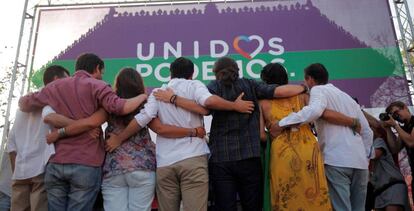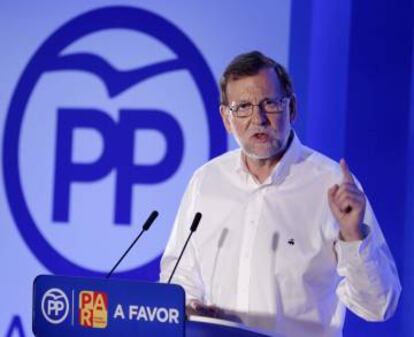Spain votes again on Sunday, but could there be a third election?
As Spaniards prepare to go to the polls again, analysts warn that few things have changed, other than the fact that voter hopefulness has morphed into weariness

Spaniards are preparing to go to the polls again on Sunday. It will be the second time they are asked to vote in general elections after the first ballot, on December 20, resulted in a fragmented parliament where no party had the 176 seats required to form a government.
But after months of fruitless cross-party negotiations, it is not at all clear that this fresh election will be the last. With polls suggesting a very similar outcome – a victory by the Popular Party (PP), followed by Unidos Podemos, the Socialist Party (PSOE) and Ciudadanos, with nobody strong enough to govern on their own and no desire to reach governing deals through compromise – political analysts say that a third election is not unthinkable.
In fact, it would not even be new. As political science and sociology expert José Ignacio Torreblanca notes, Spain held three general elections between 1918 and 1920.
This Sunday, let’s not divide the moderate vote...or Pablo Iglesias could reach La Moncloa
Acting PM Mariano Rajoy
But there are some differences between the state of affairs before the general election of December 20 and now. For one thing, the leftist coalition Unidos Podemos has already overtaken the Socialist Party (PSOE) in the polls, and stands to bump the latter down from second to to third place.
For another, the center parties are weaker, with Ciudadanos poised to lose a couple of seats according to the latest polls. But they and the PSOE will remain instrumental in their role of kingmakers.
And finally, Spaniards’ mood has changed “from one of hope to one of weariness,” said Marta Romero, a political analyst at Alternativas Foundation.
Sign up for our newsletter
EL PAÍS English Edition has launched a weekly newsletter. Sign up today to receive a selection of our best stories in your inbox every Saturday morning. For full details about how to subscribe, click here.
The political map has not changed much over the last six months. Graphs created by the election analyst Jaime Miquel Andrada show that the Socialists remain strong in the south, while the PP gains some ground in the central provinces and Unidos Podemos makes headway in Galicia, Basque Country and Catalonia (where its right-to-decide message finds sympathetic ears), as well as Madrid, Valencia and the Canary Islands.
An analysis of a dozen studies suggest that the PP will win between 6.7 and 7.3 million votes, followed by Unidos Podemos (between 5.5 and 6.2 million), the Socialists (between 4.7 and 5.4 million) and Ciudadanos (between 3 and 3.7 million).
Marcos Sanz, an analyst at polling firm Metroscopia, says that June 26 has come at a moment that the Italian philosopher and politician Antonio Gramsci defined back in 1937 as a time when “the old is dying and the new cannot be born; in this interregnum, morbid phenomena of the most varied kind come to pass.”
Numerically, the most likely coalition would be one between the PSOE and Unidos Podemos, but Juan Jesús González, who teaches at the distance university UNED, says it would be the most difficult alliance of all. That is why “we cannot rule out a third election.”
Here is what the main parties are saying ahead of Sunday.
The PP hangs tight
Safe in the knowledge that polls are on its side, the PP is hanging tight despite the late-breaking scandal affecting acting interior minister Jorge Fernández Díaz and allegations that he tried to launch criminal investigations against Catalan politicians who support sovereignty.

“That’s a story that’s going to have no effect,” said acting prime minister Mariano Rajoy. Privately, party leaders even insinuated that their results elsewhere in Spain might benefit from the allegations that the PP was trying to be tough on Catalan separatists.
But Rajoy is choosing to focus the fight on Ciudadanos, whom he sees as his greatest rival at the polls. On Thursday, he visited rural Spain again and said that Ciudadanos leader Albert Rivera never sets foot in the countryside and does not represent its interests.
“Let’s not divide our strength,” says one of two PP videos released on Thursday to win back disaffected voters who cast their ballots for Ciudadanos in December. The main goal, says the video, is preventing “an extremist, radical government” headed by Unidos Podemos. “This Sunday, let’s not divide the moderate vote...or Pablo Iglesias could reach La Moncloa.”
Statistics suggest that around 10% of PP voters have switched to Ciudadanos instead, and that the exact same percentage of PSOE voters have also changed to the emerging party advocating government reform.
Socialists, unite
Meanwhile, the Socialists have been issuing a similar call, calling on all progressives and reformists to vote for the PSOE. Former statesman Felipe González, Spain’s longest-serving prime minister, put the finishing touch on the Socialist campaign race, warning against Podemos at a rally in Villaverde, in southern Madrid.
“We the Socialists cannot have as partners those who would break up Spain,” he said in a clear reference to Podemos’ position on the right to hold regional referendums on independence. González used the Brexit victory in Britain as evidence of what populism can do, no matter what its ideology.
Ciudadanos has a plan
Ciudadanos wants to meet with the PP and the PSOE a day after the elections, and has already worked on a strategy for all three parties to break the stalemate. José Manuel Villegas, Ciudadanos’ campaign manager, said Rivera will walk into the meeting with 10 specific proposals for a three-way deal.
“They are positive proposals for a government of change,” he said.
Podemos adopts a harder line
Until now, Pablo Iglesias of Unidos Podemos had been insisting that he is still “reaching out” to the PSOE for a post-election governing deal between Spain’s progressive forces.
But speaking on Thursday at a packed rally in Jerez de la Frontera, in the southern region of Andalusia, Iglesias warned that “nobody is going to prevent Unidos Podemos from governing this country.”
“This is not an electoral alliance, this is an alliance for change,” he added, standing next to his coalition partner Alberto Garzón of the United Left federation. Then, addressing the Socialists, he said: “If you make the wrong choice, if you choose the PP, we are warning you right now that mediocrity and bureaucracy will not stop historical change in this country. If it’s not next week, it will be in two years.”
English version by Susana Urra.
Tu suscripción se está usando en otro dispositivo
¿Quieres añadir otro usuario a tu suscripción?
Si continúas leyendo en este dispositivo, no se podrá leer en el otro.
FlechaTu suscripción se está usando en otro dispositivo y solo puedes acceder a EL PAÍS desde un dispositivo a la vez.
Si quieres compartir tu cuenta, cambia tu suscripción a la modalidad Premium, así podrás añadir otro usuario. Cada uno accederá con su propia cuenta de email, lo que os permitirá personalizar vuestra experiencia en EL PAÍS.
¿Tienes una suscripción de empresa? Accede aquí para contratar más cuentas.
En el caso de no saber quién está usando tu cuenta, te recomendamos cambiar tu contraseña aquí.
Si decides continuar compartiendo tu cuenta, este mensaje se mostrará en tu dispositivo y en el de la otra persona que está usando tu cuenta de forma indefinida, afectando a tu experiencia de lectura. Puedes consultar aquí los términos y condiciones de la suscripción digital.








































